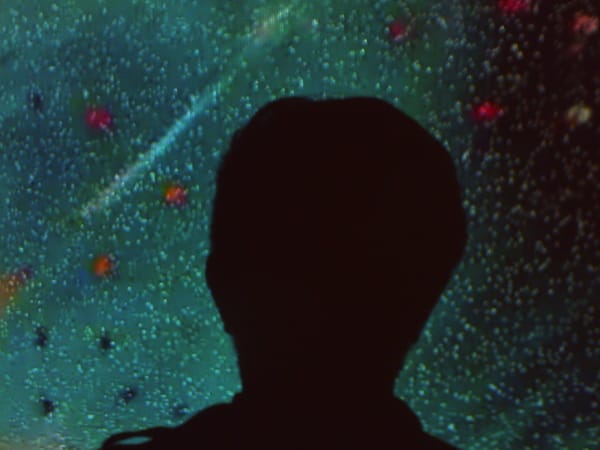Data Prior to Language
If the author is dead, why isn't the LLM?

Roland Barthes and the Death of AI
On a surface level, "The Death of the Author" might cause AI critics to bristle. Roland Barthes' 1967 essay argues that an artist's intention makes no difference to the interpretation – or, one presumes, the value – of a work of art.
The author is a result, Barthes argues, of a modern preoccupation of the individual, distracting us from the statement of a work by focusing on the author of the work. The result is an overvaluation of identity, biography, and intention as we grapple with the "correct" interpretation of the work's meaning. In other words, when we think about the author of a text as the central topic of interest, the meaning of the work shifts from something produced in the reader to something crafted by the writer.
Barthes was enormously influential, and we still see this emphasis everywhere: writing of a novel, or the crafting of a painting, or production of an image is ascribed to an act of will, the result of an individual shaping the design of a message through the mastery of tools. Certainly, the achievement of a work of art is impossible without it: how do you make anything without, y'know, making it?
This emphasis on the author has been newly strengthened by the visceral reaction to Diffusion and Large Language Models, capable of generating text and images without any discernible author at all. This absence of the author asserts that AI text cannot have meaning, setting authorship back at the center of literature and art.
On the one hand, those who despise these tools will argue that that the computer can have no intention, which is true: they are constrained by processes they cannot stray from. The more problematic extension of this fact is an argument that LLMs and image synthesis tools are therefore incapable of creating art or meaning.
Barthes almost predicts the rise of LLMs in one passage, in which he notes that linguistics is capable, even then, of producing authorless sentences:
Last, outside literature itself (in fact, such distinctions are becoming quite dated), linguistics furnishes the destruction of the Author with a precious analytic instrument, showing that the speech-act in its entirety is an "empty" process, which functions perfectly without its being necessary to "fill" it with the person of the interlocutors: linguistically, the author is nothing but the one who writes, just as I is nothing but the one who says I: language knows a "subject," not a "person," and this subject, empty outside of the very speech-act which defines it, suffices to "hold" language, i.e., to exhaust it. ... We know now that a text consists not of a line of words, releasing a single "theological" meaning (the "message" of the Author-God), but of a multi-dimensional space in which are married and contested several writings, none of which is original: the text is a fabric of quotations, resulting from a thousand sources of culture.
I frequently encounter a half-baked assertion that the mechanical writing of LLMs or diffusion does the work of the artist because the work of the artist is never original, and that all stories are versions of other stories re-assembled for new audiences.
At first glance it may seem that this is Barthes' proposition, too. Barthes may even be mistaken for the most brutal AI booster:
the writer can only imitate an ever anterior, never original gesture; his sole power is to mingle writings, to counter some by others, so as never to rely on just one; if he seeks to express himself, at least he knows that the interior "thing" he claims to "translate" is itself no more than a ready-made lexicon, whose words can be explained only through other words.
But there is some redemption for the Author, even in Barthes. There is some irony in interpreting Barthes' intentions in writing a work which famously decried the intentionality of authors, so I want to be clear: I am not interested in Barthes as the author, or his biography, or his intent. I am interested in the argument of the essay, which the result of an argument interpreted by the reader. The death of the author, then, is somewhat distinct from the death of meaning in a text. I think this is frequently confused.
The point of Barthes' argument is, I think, this:
"No one (i.e., no "person") says it: its source, its voice is not the true site of writing, it is reading."
That is to say, it is the reader who ultimately makes the meaning of the text through their own interpretation and references while the writer sets the conditions for which meaning will be received. If this is true, then there is, indeed, no real point to determining whether a sentence, or an image, was created by a machine, or some brilliant literary mind.
Here we discern the total being of writing: a text consists of multiple writings, proceeding from several cultures and entering into dialogue, into parody, into contestation; but there is a site where this multiplicity is collected, and this site is not the author, as has hitherto been claimed, but the reader: the reader is the very space in which are inscribed, without any of them being lost, all the citations out of which a writing is made.
The argument suggests a crucial shift in the focus of the analysis of work, one which examines the effect on the reader, and the freedom of the reader to interpret a text according to their own context. The death of the author is the death of the centrality of the author's intention in that analysis. For example, one may read a 17th-century novel and find feminist streams of thought within, even if the author has no sense of contemporary feminist politics.
Barthes has written other texts, including texts that aim to better define the role of the writer in this new, post-authorial world. In those, he gets around to the defense of the (human) author – not as the authority for the meaning of a text, but as the originating arranger of its materials and meanings.
Training the Reflexes of Art
In Writing Degree Zero, Barthes makes quite clear that all this talk about language is more complex than dead things ought to be. Rather, language and the familiar patterns of its arrangements are there to be resisted: the author is defined as much by the words they choose as by long list of cliches they refuse to hang their meaning upon.
George Saunders writes that "the poet proves that language is inadequate by throwing herself at the fence of language and being bound by it. Poetry is the resultant bulging of the fence."
While the literary author aims to transcend the probabilistic structures of common meaning, the LLM is optimized to reproduce them. Even if an AI created something sublime, it would be achieved entirely through the meaning created by the reader, not the author. Artists strive to throw their body against cliche, wherein the LLM is designed to produce the most efficient shorthand. Barthes again:
A language is therefore on the hither side of Literature. Style is almost beyond it: imagery, delivery, vocabulary spring from the body and the past of the writer and gradually become the very reflexes of his art. Thus under the name of style a self-sufficient language is evolved which has its roots only in the depths of the author's personal and secret mythology, that subnature of expression where the first coition of words and things takes place, where once and for all the great verbal themes of his existence come to be installed.
He later adds:
A language and a style are data prior to all problematics of language.
Elsewhere, in On Racine, Barthes calls out the idea of privileging the author as a means of erasing the context of the author's cultural specificities, in terms that I think our current mood – not the "genius author," but the "AI author as genius," – reproduces, rather than embraces:
[B]y focusing on the author, by making the literary “genius” the very source of observation, we relegate the properly historical objects to the rank of nebulous, remote zones; we touch on them only by accident, in passing.
Could a contemporary essayist describe the training data of a generative AI system any better? The generative "genius" of artificial intelligence, built on the sloppily assembled mechanics of visual and textual culture, producing words we obey or trust as if written from authority – along the way, passing the source of that text, or that image, off to the corners of vector space, where they are left to accidentally collide in response to our queries.
Despite arguing that the death of the author justifies these assemblages of training material, the AI evangelist simply reproduces the cult of the author – "superintelligence!" – in the form of linguistic and grammatical mechanics over the transmission of experience. This, I would argue, is the opposite of the argument Barthes sets out to make.
The Life of the Reader
Our control over symbols is stripped away in a work, and take on new meanings as they are placed into new contexts. It's a bit of an absurd example, but I remember being shocked after hearing "Weird Al" Yankovic's Christmas single, "Christmas at Ground Zero," shortly after the September 11 attacks.
Initially a hokey satire of Christmas music that juxtaposed holiday cheer within the darker, but fantastical context of a nuclear war, the song was released in 1986. When I'd heard it, "Ground Zero" has shifted from describing a nuclear site to the collapsed World Trade Center, and the song has a far more disturbing meaning than poor Weird Al ever intended.
Intention did not matter to the interpretation of the text. Nonetheless, Yankovic accepted this and responded by shelving the song and avoiding it in live performances. I mention this as a drastic example of the way that we must abandon our desired interpretation, rather than assert our preferred meaning, even when the interpretation strays wildly from our original intention.
But it also speaks to the ability of the author to hold themselves accountable for the meaning of this work: you don't have to play the song. You don't have to produce the text. The author has a choice.
The problem with LLMs is not that their text is meaningless. The problem is that they are full of untethered meaning, without awareness or reference to the cultural context in which they are circulated. The risk of these systems is not that they produce gibberish, but that they produce and circulate unguided, unconsidered and often irresponsible meanings.
The danger is that the "author" of these texts – the LLM, or diffusion model – is not dead enough. If the death of the author argument emphasizes that authorial intent makes no difference to the interpretation of text, it does so with the caveat that the reader is the final source of interpretation. And yet, we see endless reliance on the authority of LLMs not as sources of creative fiction (which is closer to how they ought to be understood) but as early steps toward objective, fact-based reasoning machines.
In other words, the death of the author isn't the source of our problems with LLMs. The problem is precisely what Barthes articulated about authorship: the false correlation of authorship and authority. Barthes, instead, asks: What sense might the reader make of these words?
Barthes suggests that the reader must understand these – and all! – texts, again, as the result of their own interpretations. Therefore, the death of the author must also mean the death of "authoritative" AI. That is, we must abandon the idea of understanding authorship as a form of authority over the text that is produced, and understand that the meaning is brought forth from our own minds.
We cannot argue that the author is dead and then use AI to reanimate the corpse.
The new archive for this newsletter can be found here.
If you're looking to escape from X, I recommend Blue Sky. It's now at a level of polish that rivals Twitter's glory days. If you sign up through this link, you can immediately follow a list I've hand-assembled with 150 experts in critical thinking about AI.





